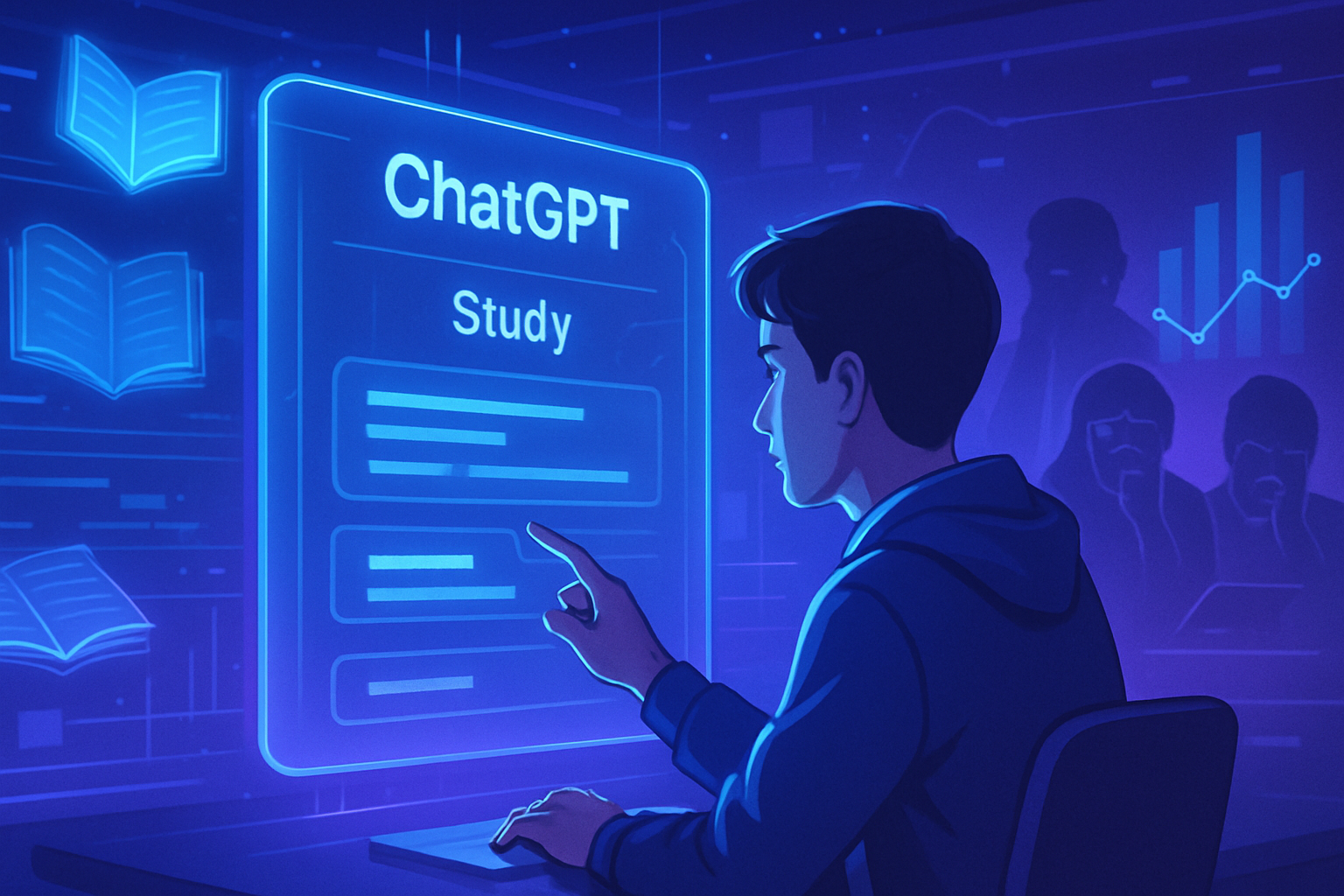The rapid rise of artificial intelligence questions the modern educational landscape. ChatGPT’s ‘Study’ mode aims to transform learning by encouraging students’ autonomous reflection. Despite this innovation, legitimate fears remain regarding its potential misuse for cheating. The question arises: could this educational tool not promote inappropriate reliance on artificial intelligence assistance?ChatGPT unveils its ‘Study’ mode, but concerns about cheating persist
ChatGPT’s new ‘Study’ mode
OpenAI recently launched a new mode, dubbed ‘Study’, for its famous chatbot ChatGPT. This feature is designed to promote reflection among students rather than directly providing answers. This mode was launched on July 29, accessible to all users, whether they are subscribers or not.
An interactive approach to learning
This ‘Study’ mode relies on an interactive method, inspired by the Socratic technique. The artificial intelligence asks questions to the user to help them develop their critical thinking. The goal is to lead the student to find solutions on their own, which represents a significant advancement in the use of AI in education.
In this context, ChatGPT invites the user to express their opinions on various topics. For instance, during a test conducted by Le HuffPost on a philosophy essay topic, the AI initially asked the user’s opinion on the question “does our future depend on technology?”. This approach is designed to encourage personal reflection while guiding the user in their learning process.
The limitations of the feature
Despite this innovation, several concerns remain regarding the effectiveness of the ‘Study’ mode. Indeed, once the user gives their opinion, the chatbot offers choices that could potentially negate the benefits of this approach. For example, when asked to write the introduction of an essay, ChatGPT allows the user to choose to write sentence by sentence or to handle it completely.
This flexibility raises concerns about cheating. Students may easily revert to the classic version of the AI, which provides immediate answers without necessarily going through the learning process. Without proper guidance, young users may be tempted to bypass the educational intentions of the new mode.
A need for parental control
Because the ‘Study’ mode is not automatically activated, a lack of parental control could make it difficult to regulate its use by students. The current context raises questions about the ethics of such technology, especially when used in a school setting. OpenAI must consider these challenges to ensure that its innovation is truly beneficial for learning.
Future perspectives for AI in education
Technology, notably through programs like ChatGPT, continues to evolve and raise complex issues. Solutions must be accompanied by a rigorous pedagogical approach to ensure that AI serves as a valuable assistance in education rather than an instrument of cheating. The educational community must remain vigilant and adapt to the opportunities and challenges related to integrating quality assurance in future learning systems.
For more analysis on the impact of artificial intelligence on education, check out the articles on the baccalaureate and the ethical dilemmas of AI.
Frequently asked questions about ChatGPT’s ‘Study’ mode and cheating concerns
How does ChatGPT’s “Study” mode work?
The “Study” mode of ChatGPT asks the user questions to encourage reflection rather than providing immediate answers. This allows students to learn through a process of self-discovery, similar to a Socratic method.
What steps does the AI propose to help with writing an assignment in “Study” mode?
In “Study” mode, the AI guides the user through different steps to construct an assignment, first encouraging them to share their opinion on the subject before clarifying how to structure the introduction, arguments, and conclusion.
Does the “Study” mode prevent students from cheating by requiring complete writing?
While the “Study” mode is designed to promote learning and reflection, there are limits, as students can easily ask the AI to write their assignments entirely, which may lead to cheating practices.
How can we ensure that students use the “Study” mode responsibly?
The responsibility for using the “Study” mode ethically rests on the student. Without parental control to block other features of ChatGPT, it is difficult to guarantee that users will not access direct answers.
Why is the “Study” mode not enabled by default?
The fact that the “Study” mode is not enabled by default encourages users to make a conscious choice to learn. This aims to promote more responsible learning habits, less focused on merely seeking quick answers.
How can parents monitor their children’s use of ChatGPT?
Parents can discuss with their children about using AI for homework, set clear rules regarding its use, and encourage independent learning to minimize opportunities for cheating.
What types of subjects are suited for using ChatGPT’s “Study” mode?
The “Study” mode is particularly effective for topics that require critical analysis, such as philosophy, history, or science, where reasoning and personal reflection are essential.
Does the “Study” mode really improve students’ academic skills?
The “Study” mode aims to improve academic skills by encouraging students to think critically, but its effectiveness depends on the student’s genuine commitment to using this learning method.






